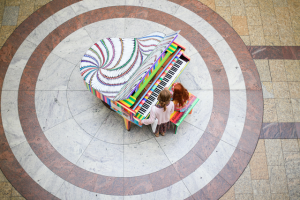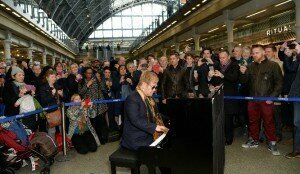In praise of street pianos
A piano asks to be played and is a wonderful reminder of the nature of play and the pleasure of making music, regardless of genre. Most people passing by a piano can’t help but strike a few notes, improvise a riff, or play a whole piece. A street piano invites us to pause, do something spontaneous, bring pleasure to others and enjoy ourselves.

Grand Piano in Bristol, UK
© www.streetpianos.com
Street pianos attract players of all ages and abilities – Sir Elton John and the Russian pianist Valentina Lisitsa have both played the street piano at London’s St Pancras Station, amongst countless others. Members of a piano club I’m connected with made a special club trip to play the street piano at St Pancras to perform exam pieces and other repertoire, treating the experience as an important performance opportunity.
For those of us of a very nervous performance disposition, these are GREAT. For attracting more people to music making rather than the commercialised electronic production and marketing the general public THINK is music, even better.
– David, advanced amateur pianist, London
For many people, street pianos offer a special kind of pleasure, an escape from the everyday, a chance share music with others, or simply to practise. Many people, including a number of professional pianists, highlight the usefulness of street pianos for practising while waiting for a train, especially if one doesn’t have access to an acoustic piano at home.
…street pianos are a great way to connect with people who may never have come to a concert before
– Daniel Roberts, concert pianist, Brazil

Elton John playing a street piano at St Pancras Station
© The Guardian




